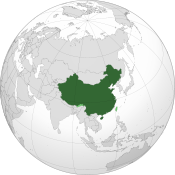Imperial College London geology students fined in China for "illegal map-making"
Monday, January 5, 2009

Three British geology students of Imperial College London have been fined in China for "illegal survey and map-making activities", according to local media. In addition to making maps, the students were researching fault lines and earthquake activity in Xinjiang — a tense Muslim province to the west of the country where anger against Chinese rule sparked deadly attacks in 2008.
The students were gathering additional data in several regions, including Kashgar, the ancient Silk Road trading post, and an oasis city in the Xinjiang Uyghur Autonomous Region of the People's Republic of China.
Under Dr. Jian Guo Liu, the students' supervisor at Imperial College, they also had been in the poor desert village of Keping, where in May local authorities burned the local mosque due to "unlawful religious activities". Of the three students, two of them, a PhD student aged 23, and a Master of Science student aged 22, went to Aksu Prefecture for their research.
In September, State Security Bureau officials had investigated the students at a hotel for several hours. Thereafter, their equipment, including GPS devices, survey results, and data, were seized. The Aksu Land and Resources Bureau officers claimed they had gathered "illegal data" from 6,000 points which was valuable for mineral prospecting and topographical research.

In the leadup to last year's summer Olympics in Beijing, China cracked down on map-making and data-collecting across the country. Despite having permission from the Earthquake Administration in the country, the students were fined a combined 20,000 yuan (2,940 dollars) but did not receive additional punishments. "The data they gathered would have been valuable in analysing mineral and topographic features of the areas," Xinjiang Daily said. They returned to the UK on October 2.
According to The Procuratorial Daily, the Xinjiang prosecutors' office approved 1,295 arrests of individuals and indicted 1,154 suspects from January to November 2008. The indictments were based on suspicion of "endangering state security." In 2007, however, only 742 were arrested, while 619 of them were indicted for the same offense.
Related news
- "Chinese media face fines for disaster reporting" — Wikinews, July 4, 2006
Sources
- Richard Spencer. "British students fined for 'illegal map-making' in China" — The Daily Telegraph, January 5, 2009
- "China fines UK students for 'illegal map-making': state media" — Agence France-Presse, January 5, 2009
- Edward Wong. "Nearly 1,300 arrested in Muslim region of China" — International Herald Tribune, January 5, 2009
- "Kashgar" — Silkroadcn.com, 2008



